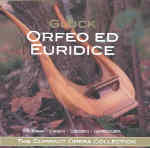This is tied for the finest performance of this opera in its 1762, Italian-language Vienna version, in which the role of Orfeo was scored for castrato. The other performance, on Harmonia Mundi and led by René Jacobs, features mezzo Bernarda Fink in the role, and her singing is simply gorgeous. Here, John Eliot Gardiner opts for a countertenor, Derek Lee Ragin, whose alternately dignified and heart-on-sleeve rendition, in which he sings exquisitely no matter what he’s feeling (meaningfully embellishing the vocal line–heartbreakingly so in “Che faro…,”), is even better, and in a way, possibly “righter”. However, rather than try to make that argument, which goes nowhere, suffice it to say that Ragin is remarkable–as is the whole performance.
Gardiner makes the Elysian Fields absolutely heavenly and the demonic passages terrifying. Throughout, his tempos and setting of mood are always at the service of the seat of passion. And his orchestra and chorus are magnificent. You’ll find nothing wrong with any of it. Sylvia McNair is a perfect, slight Eurydice; in a role as small as this, her rather thin tone never bothers. Cynthia Seiden makes the most of Amore. The sonics are rich and realistic. Wonderful! [7/13/2002]
































